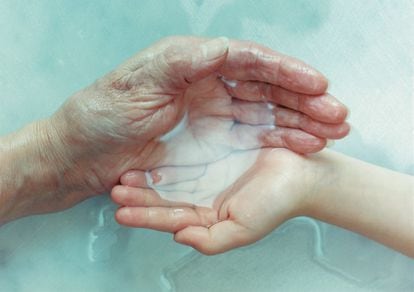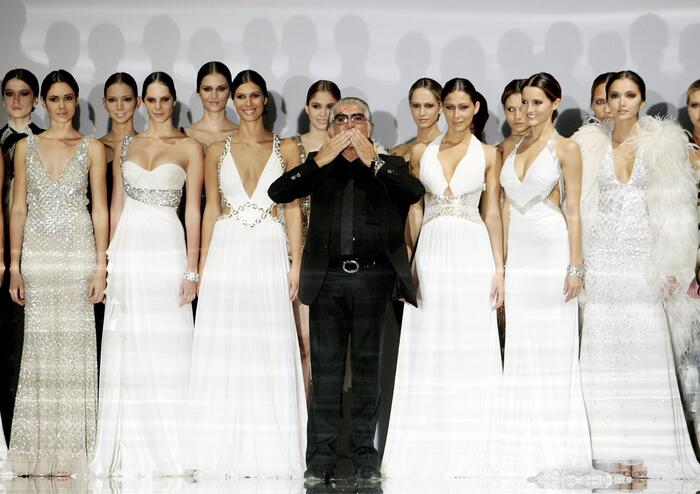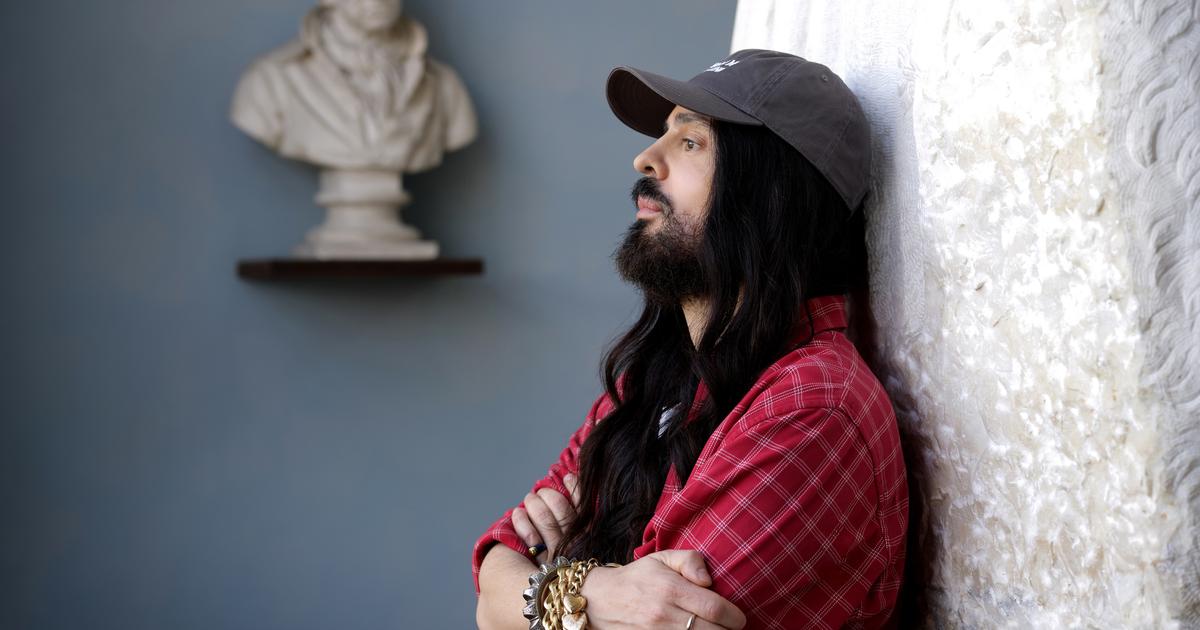Note to readers: EL PAÍS offers the Future Planet section for its daily and global informative contribution on the 2030 Agenda. If you want to support our journalism,
subscribe here.
The Dutch researcher Lidewij Edelkoort (1950) has spent decades predicting social movements, trends, fashions ... And the internet lies say that she is always right.
For this reason, from the haute couture firms to those of clothes to walk around the house, they hire their services.
That was his world.
He wrote prized reports that the industry read carefully.
If she advanced news is that they would be in vogue.
Until in 2015, when global leaders agreed at the UN on a new roadmap to build a more sustainable and just planet (dubbed the 2030 Agenda), Edelkoort wrote his
Antifashion Manifesto
because his world also needed a change of course.
More information
Achim Steiner: "If we don't act now, history books will write about our failure"
The journeys that changed Thao Phuong: from Vietnamese raft girl to fashion designer and artisan advocate
The love story that brought a weaver to Niger
The text stirred consciences in an industry that produces between 80,000 and 100,000 million garments each year, responsible for 8% of greenhouse gas emissions and 9% of microplastics that end up in the oceans.
That only in terms of environmental impact.
It also hides shame in the human aspect.
"Writing it was painful," says Edelkoort.
Since then, he has warned of the threat posed by rampant production and consumption, the use of chemicals and other harmful practices in the fashion industry.
But with the pandemic, he went one step further.
Together with his collaborator, designer Philip Fimmano, he thought they should take action.
In 2020 they created the World Forum of Hope, an event of innovative ideas that represent the change that both promote.
The first was held last October in the Netherlands - the event was completely
online,
but the initiatives are focused on one country.
After passing through France, Brazil and Japan, the last one took place in Spain, with an in-person audience for the first time.
It was in Palma de Mallorca during the international meeting of artisans XTANT.
Both sat in the shade of the Esbaluard Museum to discuss their concerns and proposals.
Question.
How did you get to the
Antifashion Manifesto
?
Response from Edelkoort.
There came a point where I felt very guilty for being part of the machinery of the industry and pretending nothing was wrong.
I understood that if I wanted to continue what I was doing, I had to write something.
It was a duty.
I rewrote it many times to make it perfect, but it was very painful because it was about my community.
Q.
Why did you feel guilty?
RE
Because we all pretended that what we were doing was fashion when it hadn't been for a long time.
I felt that it was necessary to say it.
And to be clear: I'm not against clothes, but let's call it clothes and not fashion.
Q.
How do you get a change without making people feel guilty?
RE
They had to feel guilty, that was the purpose. And they actually felt guilty, but they also told me that they couldn't escape. And I think the manifesto has helped. Many schools use it early in their learning cycle. Most in the industry have read it. So it has had an impact, but not enough. The fact that we are still talking about the manifesto means that it is still there and that we can continue to discuss.
Response from Fimmano.
One of the biggest calls for attention was the collapse of a building in Bangladesh in 2013, when more than 1,000 people died because working conditions were to keep prices low.
Li made an interesting installation a couple of years before writing the manifesto, which was also a warning about the manufacturing toll.
That was the first time he spoke of guilt.
It was to say that, just as it is claimed that wearing fur kills animals, when you consume cheap fashion it means that you are killing people.
There came a point where I felt very guilty for being part of the machinery of the industry and pretending nothing was wrong.
Li EdelKoort
And six or seven years later we have the pandemic. The fashion industry employs hundreds of millions of people around the world and factories closed because orders were frozen. Tens of thousands of people in India and Southeast Asia had to walk back to their villages, they did not have the money to take a bus or a train, because they were left without work. Many fashion companies did not pay their bills, they did not take care of those workers because they were too busy not to fire people in the design rooms in Europe and America. None made a press release saying that they would support the families of their workers, with accommodation and food, until everything was reactivated. When we talk about guilt and fashion, this is the biggest.We are talking about hundreds of millions of people who work in the textile and clothing sector.
Q.
If there was a change of model in the industry, what would happen to all those people?
RE
They have to set up workshops to create their own garments, for their countries and neighboring countries. They already have the skills, they just need additional knowledge in design and layout. In general, in the future, each region should produce for itself. India is importing huge quantities of polyester sarees from China; it is completely polluting the earth, but also the history of clothing. We can't keep transporting back and forth, over and over again. In Normandy, where I have a home, there are many flax fields. It is harvested and then sent to China because no one in France can make the yarn, then that yarn made in China goes back to Europe to the luxury houses that make garments that are then sent to China as well. Is incredible.
P.
Therefore, it is not about killing the industry, but reinvesting it locally.
RE
Yes, we need to reinvent the local.
And I would also say, empower workers and develop their creativity, their ideas.
They can also be given small loans.
There are amazing embroiderers and skilled workers who can continue their work because it is not massive.
The real problem is this huge amount of ugly clothes with horrible fabrics.
There came a point where I felt very guilty for being part of the machinery of the industry and pretending nothing was wrong.
Li Edelkoort
Q.
And do you think people are more aware of the impact of industry on agriculture, water, the planet?
RE
Yes, but everyone likes to look handsome.
And they yield.
Although I think people feel guilty, that's why the second hand is on the rise.
Q.
What do you think of some initiatives of the big brands, which try to be or pretend to be sustainable?
RE
Some are.
Steps have been taken, especially in the field of fiber, textiles.
The problem is in the clothing industry, in the amount of clothing, collections, articles ... The exorbitant numbers ... We do not need all that.
RF
Consumers have a lot of pressure with the loan of their cars, pay the mortgage, feed their children.
Worrying about how to pay for vacations, Christmas… They don't have the capacity to make big changes, even though young children probably want them to make them.
So, brands have to take responsibility for educating and doing things well, because they are the ones that have the power to use their profits, reduce them, to act correctly.
Brands have to take responsibility for acting correctly, because they are the ones with the power to reduce, to do better
Philip Fimmano
It cannot be said that by teaching consumers, they will choose well.
Because they will always opt for the best offer and be able to do whatever they want.
But each brand can take responsibility for educating its consumers on why things cost more and also from its own waste.
It is impossible for a single company to take care of all the waste, so each one will have to do it themselves.
I think that is the best solution.
P.
Other industries such as food or technology are not sustainable either ...
RE
It occurs in all industries, but in fashion it is particularly terrible.
Since the beginning of the century it has run amok.
Before, there was still a kind of common sense.
And suddenly, the amounts were overwhelming.
Artificial intelligence should let them know how much they are going to sell.
But billions of garments are still burned.
So where is the error?
Who is responsible for all this excess?
It's strange, it shouldn't happen.
Artificial intelligence should let them know how much they are going to sell.
But billions of garments still burn
Li Edelkoort
Q.
The collapse of the Rana Plaza was a turning point.
But do you think youth environmental movements like
Fridays for Future
can drive industry transformation?
RE
They are a great generation and they are changing.
Many do not even buy clothes, they exchange them.
That helps.
If you have a generation that breaks the chain, that will help create a new system.
Q.
They have hope in the new generation.
And you organize a World Forum of Hope, what does it consist of?
RE
We were together in South Africa and gave a written interview to
Dezeen
magazine
that was read by a million people. Crazy. It was about covid and what would happen. And suddenly I understood that there are many people listening to us. We talked about it and thought we had to do something, not just write. We need to be more activists. And we created this idea of a forum that would be the anti World Economic Forum, based on the creativity and vision of the future that creators have. What we do these Saturdays is to unite people from all over the world, each time in a new country, presenting great speakers who tell how they left a job because they couldn't take it anymore, they started doing something different and now they are very successful. They explain how they make 99% eco-friendly sneakers and sell more than nine million. And they also pay all their employees very well. And then they talk about the problem of water and food solutions.You move for a day to Japan, Brazil or Spain. And when it ends, you have hope. You think that maybe it is possible to change. That is what we want to achieve.
RF
These people inspire others to do the same.
They used to be in large companies, they were vice presidents, managers, and they turn their backs on making money to do something that is good.
Or better.
And still, make money in many cases.
Promotional image of the World Forum of Hope Michael Baumgarten
R.
The idea is to create a new economy, but a more equitable one.
So we have to also work on the 1% [of rich].
RF
There are other ways to earn money.
And success may be that you create jobs, I mean, be proud of your work.
Money is not the only way to get well in the future.
There is what people call the happiness economy, which is positivity as a resource.
P.
Handmade garments and sustainable fashion may not be affordable for everyone.
Is being a responsible consumer expensive?
RF
Not always.
There are some handmade products that are also inexpensive.
It depends on the time that has been invested in them, which is related to fair prices and trade.
Why should people who produce in third world countries be paid less than those here?
Success may be that you create jobs I say, be proud of your work
Q.
What system do you propose as an alternative to the current one?
RE
Holistic economic systems that, as in a family, everyone has a little.
We have to share resources, responsibility and happiness.
R. F
.
The aim of the forum when we talk about being an anti-Davos is to say that if we are going to redesign the post-covid world, creative people, designers, thinkers, architects or craftsmen should have their say and contribute.
The planet was already redesigned after World War II, and architects and designers helped reimagine a more egalitarian society.
But instead of listening to them, the power was given to the shareholders, the money people, and everything was left in the hands of marketing and finance.
We already know where they have brought us, caused a lot of environmental damage.
We know that this system does not work.
Q.
How not to make the mistakes of the past?
RE
Now we know exactly where the problem is.
In a way, it's easy to engineer a change.
But big fortunes don't like it.
They don't even pay their taxes.
This is where people can be activists by not buying from companies like Amazon.
The owner is the richest man in the world and does not pay taxes anywhere.
It is inconceivable.
It has to be punished one way or another.
Q.
Can the crisis triggered by the covid accelerate these transformations?
RF
Younger generations challenge their parents. In homes there is talk of recycling or not eating meat. They have the idea of change ingrained and try to convince people our age to change as well. When they grow up, vote and are in power, they will have the means to make different decisions.
RE
At the Polytechnic University in France, for example, more than 100 students signed a manifesto in which they promised that they would not work in industries that are harmful to the environment and that abuse people.
They will not apply to be hired.
And these are exactly the people I would like to sign. Every day there is a step somewhere.
So they can tell us that we are utopians or that we are completely insane, however, if we put all those bits of breakthrough together, we are talking about something big.
They should give all the power to women and listening would be a little easier;
because men don't know how to do it because they always want to talk
Philip Fimmano
P.
Let's hope we have enough time because we are destroying the planet very fast, according to the UN.
RE
We have a generation.
Babies born now will be the last if we don't rectify.
They will not be able to have children.
That is the deadline.
It's very urgent.
And it has to be said in these terms.
Anyone planning to have a child now should commit to working very hard in order to have grandchildren.
P.
They say that when each Forum ends they feel optimistic.
When does your pessimism emerge?
RE
When I watch fashion shows.
There are too many things, too many synthetic materials and colors.
It's disappointing.
R. F
.
Volume and waste are the biggest challenges.
Tens of millions of garments are manufactured each year, creating an outrageous volume of garbage.
Sometimes pessimism hits me, but then we teach in schools and we see that there is a whole new generation that is much more responsible, activist, and they are going to be much more strict and tough on brands than we are.
They are going to redesign everything.
It's just a matter of politicians and businesses listening.
In fact, they should give all power to women and listening would be a little easier;
because men don't know how to do it because they always want to talk.
And we need to talk less and listen more.
Especially men.
FUTURE PLANET can follow on
,
and
, and subscribe
here
to our 'newsletter'
.








